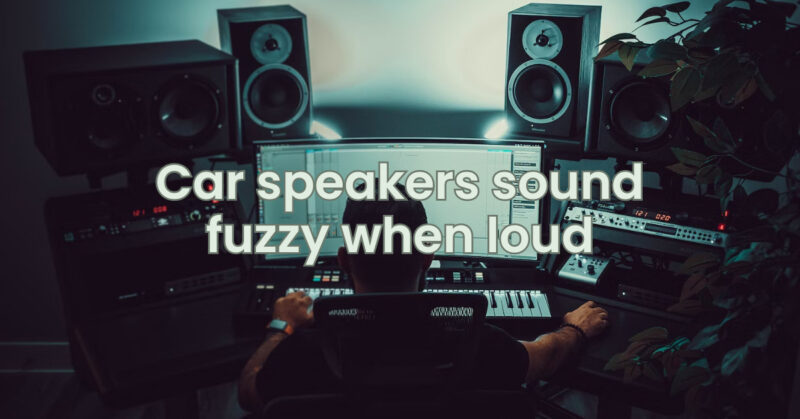There’s nothing quite like cruising down the road with your favorite music cranked up, feeling the beat in every fiber of your being. But just when you’re ready to fully immerse yourself in the music, an unwelcome visitor arrives: fuzzy, distorted sound from your car speakers. If you’ve experienced this frustration, you’re not alone. In this article, we’ll dive into the world of automotive audio systems to uncover the reasons why car speakers sound fuzzy when turned up. By exploring potential causes, understanding the interplay of audio dynamics and car electronics, and offering solutions, we’ll help you restore your driving soundtrack to its crystal-clear glory.
The Symphony of Car Audio Dynamics
To decipher why car speakers sound fuzzy at high volumes, we need to explore the intricate harmony of audio reproduction within the confines of a vehicle’s environment. Car audio systems involve a complex interplay of components, from head units and amplifiers to speakers and wiring, all working together to deliver sound that suits the unique acoustics of a car interior.
Potential Causes of Fuzzy Sound
- Distorted Amplification: At high volume levels, amplifiers might struggle to deliver clean power to the speakers, resulting in distortion and fuzzy sound.
- Overworked Speakers: Pushing speakers beyond their limits can cause them to distort and produce fuzzy sound due to the excessive mechanical stress.
- Inadequate Power Supply: If your car’s electrical system can’t provide enough power for the audio system at high volumes, distortion can occur.
- Speaker Damage: Over time, speakers can deteriorate, leading to fuzzy sound, especially when playing loud.
- Acoustic Environment: The confined space of a car can create reflections and resonances that contribute to sound distortion.
Solutions to Regain Clarity
- Upgrading Amplifiers: Consider upgrading to more powerful and higher-quality amplifiers that can deliver clean power even at high volumes.
- Quality Speakers: Invest in high-quality speakers that can handle higher volumes without distortion.
- Power Enhancements: Ensure your car’s electrical system can provide sufficient power for the audio setup. Consider upgrading the battery and alternator if necessary.
- Volume Management: Practice responsible volume control. Avoid pushing the system to its limits to prevent distortion.
- Speaker Inspection: Regularly inspect speakers for damage. Replace worn-out or damaged speakers to maintain audio quality.
- Sound Dampening: Apply sound dampening materials to the car interior to reduce reflections and resonances that contribute to distortion.
Conclusion
The frustration of fuzzy sound from car speakers when turned up is a challenge that stems from the intricate dance of audio dynamics and vehicular acoustics. By understanding potential sources of distortion, optimizing amplification, upgrading speakers, and ensuring an adequate power supply, you can rejuvenate your driving soundtrack to its full clarity and enjoy the music as it was meant to be heard. Remember, responsible volume control, quality components, and occasional inspections are your allies in maintaining an audio experience that resonates with the purest tones, even when the volume knob is turned up.


